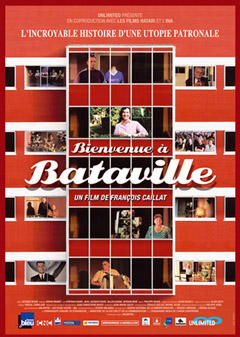
In France, a documentary about Baťa's city has started to be screened
 |
The village near the town of Moussey still exists today, although the unprofitable factory closed in 2001 despite fierce resistance from the striking workers. The documentary features former workers, including a member of the upper management, who nostalgically recall their living conditions.
However, the film is certainly not a celebratory ode to the man who set out to significantly improve the living conditions of workers accustomed to a bleak environment without any security. On the contrary, through subtle comparisons with totalitarianism, it places more emphasis on the negative aspects of the monotonous lives of workers in an artificial community.
"I wanted to tell the story of a perfect closed world, an ideal system, a boss's utopia whose golden age draws us into the 1950s and 1960s," Caillat said, noting that Baťa wanted to build a community entirely dependent on him from the ground up. According to Caillat, the film deals with "obvious contradictions": How could people be happy in such a strictly controlled daily regime? How could they maintain space for personal freedom in a world created entirely in the image of the founder and master Tomáš Baťa? How was it possible to live for years under the rule of such a paternalist? The film purportedly explores the paradox of more or less voluntary submission, bordering on serfdom, and the alienation in which prosperity intertwines with exploitation.
The documentary, interspersed with fictional elements, is narrated by the founder of the entire workers' dream, who at the beginning claims that what subordinates want is to be led. "Our work can indeed contribute to civilizing all of humanity," asserts the man at the podium, who is Baťa's namesake son and successor somewhere in America, but who will care about such details.
The film has received a rather lukewarm reception from commentators who have seen it in advance. According to Le Monde, which describes Baťa's city as a golden cage, it is an original idea, but the film loses the expected charge and ultimately provides disappointment. According to the website evene.fr, the satire of the work misses its mark and results in frustration.
In 1939, the factory employed 2,700 workers, 2,000 in 1950, and 1,500 at the beginning of the 1990s. However, in 2001, a definitive decision was made from the headquarters in Toronto, Canada, to close it. The remaining 840 workers producing 1.5 million pairs of shoes revolted and even detained one of the factory managers. However, their resistance was in vain. By 2005, a company called Hello still produced shoes on the site, but it went bankrupt. The facility then served as a warehouse for imported shoes from Asia, and last year, a film production company still operated there. In the village, which Baťa endowed with shops, a school, a vocational school, and even a church and the first swimming pool in the region, a few hundred people still live. Related towns exist under the names Batawa in Canada or Batanagar in India.
The Baťa company still employs 40,000 people worldwide and operates a network of 4,600 stores. Its motto is: People first.
The English translation is powered by AI tool. Switch to Czech to view the original text source.
2 comments
add comment
Subject
Author
Date
Baťa
Jan Vlach
20.11.08 02:20
Totalni kolektivizator?
Dr. Lusciniol
21.11.08 02:28
show all comments










